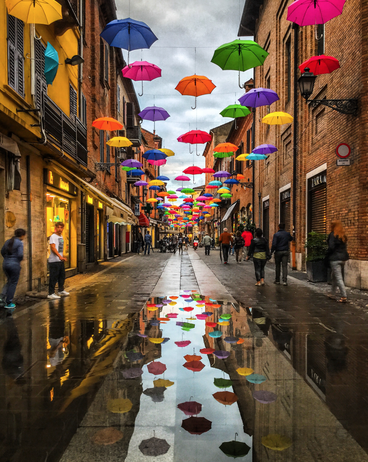Advisors as Your Resource
Beyond academics, it's critical to consider your identity when researching study abroad locations. Talk to your advisor about any concerns you have as a 2SLGBTQ+ student.
Discuss your concerns
If you'd rather talk about your study abroad concerns with someone other than your assigned advisor, UMD Sexuality & Gender Initiatives on campus is a great resource. Their staff can support you in making decisions and provide helpful resources.
Things to consider when choosing a location
- What are the local and cultural attitudes toward Americans, tourists, sexual orientation, and gender identity in the host country?
- How important is it to me to find other sexual minority students and friends while abroad?
- What resources are available in my host country for sexual minority people?
- Are there any 2SLGBTQIA+ friendly establishments?
- What are my safety needs and perceptions and how can they be best met? Is the program able to make special accommodations for students who request single rooms, private baths, certain roommates, or gender-inclusive housing?
- What are police attitudes towards local residents, tourists, and 2SLGBTQ+ visitors?
- What is considered “typical” male and female social behavior in the host country?
- What is the social perception of lesbian, gay, bisexual, transgender, or queer people in the host country? How are 2SLGBTQIA+ people socially defined? How are transgender people viewed or considered?
- What role do transgender people play in the host culture? And what are the social perceptions of transgender people?
Get to know your destination
Explore 2SLGBTQ+ travel guides and internet resources. Talk with other 2SLGBTQ+ and allied people about their experiences in certain countries or regions. Gather as much information to make your choices and decisions on a location. Once in your host country, find out what other resources are available.
Understand the context, customs & attitudes of your host country
Similar behaviors and expressions may have different meanings in other cultures. In some places, openly expressing your sexual orientation may be frowned upon outside of specific “gay” neighborhoods or resorts.
Learn the laws of your host country
Questions to consider:
- Are there public decency or indecency laws in relation to sexual orientation?
- Does the law require having “proper documentation” at all times? If so, how does it need to be documented? (documentation of gender reassignment etc.)
- What is the age of consent? Does it differ for heterosexual versus same-sex couples?
- Will laws and attitudes be the same for different social classes or geographic areas?
Other Resources:
University of Minnesota Global Programs & Strategy Alliance
The University of Minnesota Global Programs and Strategy Alliance has developed an orientation video for GLBT Students Studying Abroad.
UMD Sexuality & Gender Equity Initiatives
Check with UMD Sexuality & Gender Equity Initiatives for resources, programs, scholarships, and services to support your academic and social success while studying abroad.
NAFSA’s Rainbow Special Interest Group
This website, run by a NAFSA special interest group, offers resources on considerations, scholarships, and firsthand accounts from 2SLGBTQ+ individuals who have studied abroad.
GoAbroad.com resource book for 2SLGBTQ+ travelers.
Links for news and laws around the world:
- International Lesbian & Gay Association
- Amnesty International
- European Specific GLBT Information
- Gay & Lesbian Resources in Asia
- Transgender People & Travel
- U.S. Department of State
Books:
- The Damron Men’s Travel Guide: 2013 Edition by Gina M. Gatta (Mar 15, 2013)
- Over 13,000 listings of gay-friendly establishments in the US, Canada, Mexico, Costa Rica, the Caribbean, South America, and most European capitals.
- Damron Women’s Traveller: 2013 Edition by Gina M. Gatta (Mar 15, 2013)
- Over 10,000 listings of lesbian-friendly establishments covering North America, Mexico, the Caribbean, and major capitals of Europe.
- Gay Travel A to Z: The World of Gay and Lesbian Travel Options at your Fingertips 2001 by Ferrari International (2001)
- The most complete
- Gay and lesbian travel options available anywhere are detailed in this comprehensive guide produced by a gay publisher who has exclusively specialized in gay and lesbian travel since 1980.
- Frommer’s Gay and Lesbian Europe (2003)
- This guide offers inside tips on the gay and lesbian scene in many locales, plus practical information on hotels, dining, and attractions—a must for the 74 percent of U.S. gays and lesbians who took an international trip in 2001.
Michigan State University International Studies and Programs Office of Study Abroad. (n.d.). Study Abroad for LGBTQIA2S+ Students.
